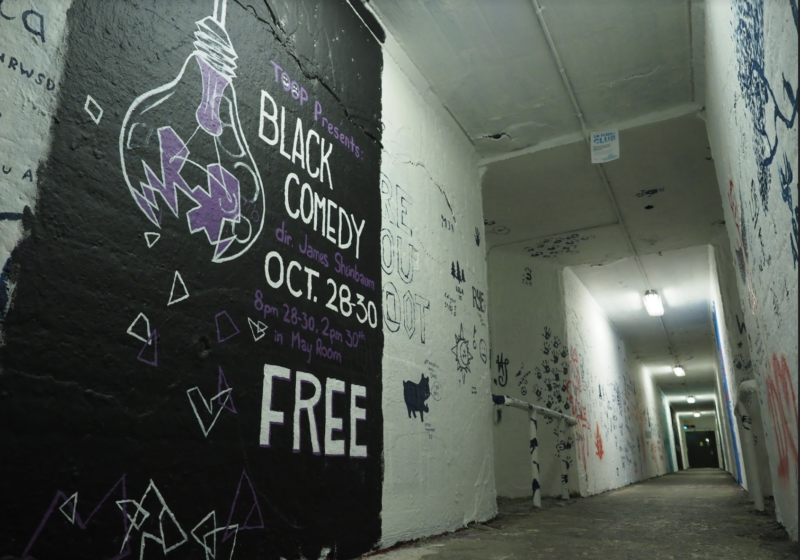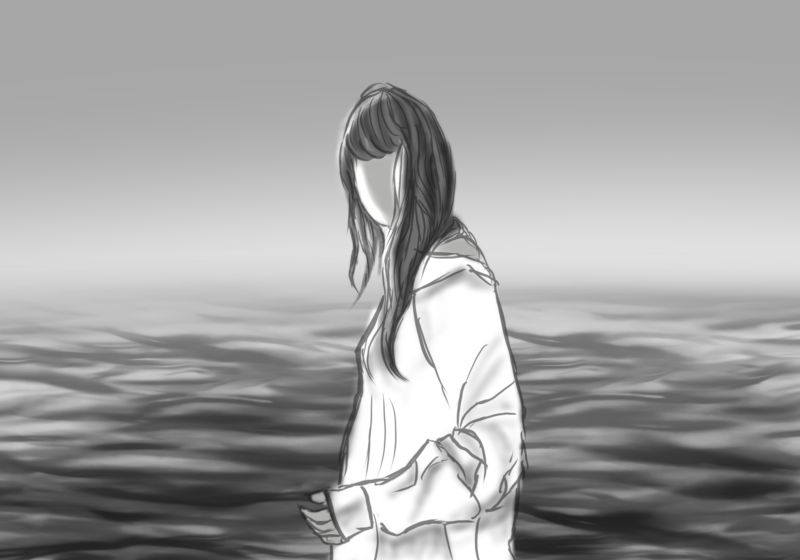After three semesters of virtual theater, I was finally able to watch an in-person performance this past Halloweekend. Peter Shaffer’s “Black Comedy” was directed by senior James Sheinbaum and put on by The Opposite Of People (TOOP). This student-run theater company is dedicated to accessible theater, so all performances were free to attend (with donations encouraged). The performance took place in Wilson Common’s May Room and ran from Thursday, Oct. 28 through Saturday, Oct. 30 every night at 8:00 p.m., with a 2:00 p.m. matinee performance on Saturday.
“Black Comedy” is a farcical play that takes place in the apartment of a young starving artist named Brindsley Miller (senior Madeleine Fordham). It’s the most important night of Brindsley’s life, as he’s meeting his fiancé’s father and trying to sell his sculptures to a millionaire art critic. In an attempt to impress both men, Brindsley has stolen all of his neighbor Harold’s (sophomore Jack Moore) antique furniture for the evening while Harold is on vacation. But when a fuse blows unexpectedly, what started as a pleasant, well-planned evening quickly disintegrates into a chaotic catastrophe for nearly everyone involved. After the arrival of several unexpected guests, the play ends with a broken engagement, a shattered statue, and a very drunk woman on a couch. In the last scene, the blown fuse is fixed, returning the stage to darkness and leaving poor Brindsley’s fate uncertain.
What made this show interesting was its reversal of light and dark. The show opened in complete darkness, but the two actors talked and walked about the stage as if the lights were on. When Brindsley’s fiancé Carol (junior Cynthia Xiao) tried to play a record and accidentally blew a fuse, the stage erupted into light — but now, the actors were left in the dark. From that point forward, the audience was made to believe that light was dark, and dark was light. The responsibility for maintaining this illusion mainly fell to the actors. They did not look directly at one another when speaking, tripped over furniture and phone cords, and had no reaction to things happening around them that they could not hear. Any light source they used, like matches or flashlights, cast a small pocket of shadow. This lighting effect was done so smoothly that I didn’t even consider its difficulties until I talked to Delaney Cummins, the head lighting designer. Cummins said that one of the biggest difficulties of designing for “Black Comedy” was how “counterintuitive it is to design with reversed lights…I think it was a good challenge as a designer because you are really not wired to think that way.”
Sheinbaum’s skill as a director showed in the cast’s performances. During rehearsals for the show, he had them do a scavenger hunt for tiny items in a pitch-black room so they could learn how to use their arms and legs rather than rely on their eyes. According to Sheinbaum, the biggest challenge was the set and props coordination. “The show has a lot of moving parts — furniture moving on and off stage, water being thrown around, on-stage light sources, Brindsley’s sculpture, and the Buddha sculpture that shatters at the end of every performance.” But thanks to “Black Comedy’s” lead set and props designers, sophomore Jackson Herrema and Max Auerbacher respectively, all these moving parts ran like a well-oiled machine in the final production.
The show was met with overwhelmingly positive reviews from the audience. There was no shortage of laughter at any point in the performance, and Sheinbaum cleverly had his actors enter and exit from the main aisle of the audience, which kept everyone alert and engaged. I was laughing the entire time, whether at Colonel Melkett’s (first-year Lilli Tamm) militant shouting, Brindsley’s silent furniture removal, or Miss Furnival’s (senior Alyssa Phillips) intoxicated antics. As for Sheinbaum, he thought that “it turned out really well on all fronts, as a TOOP product, a comedic play, and a rendition of this specific show.”





